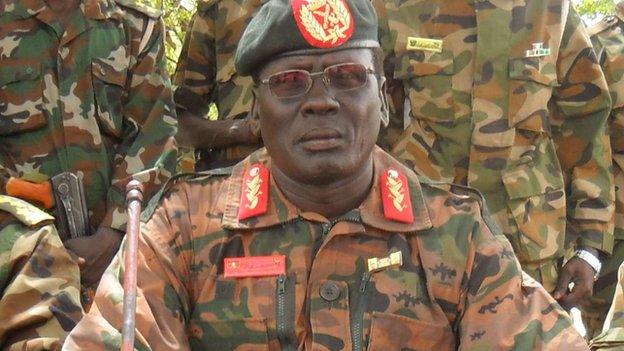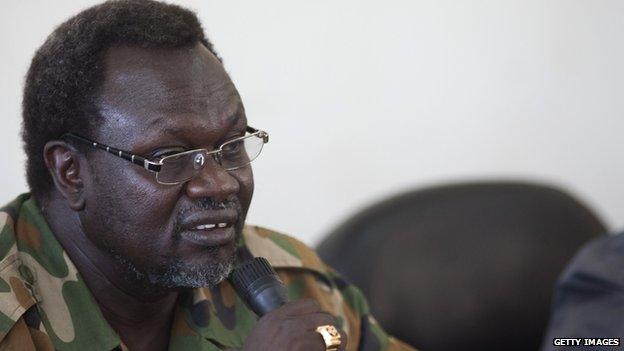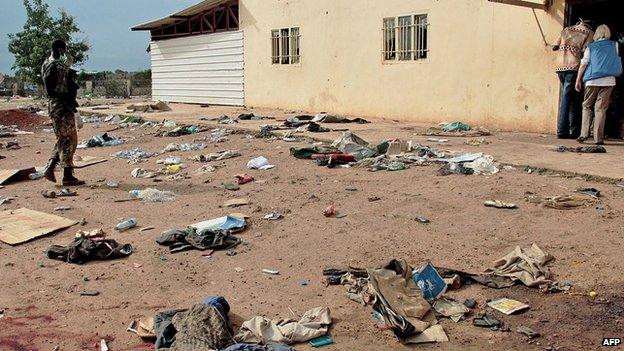Profile: South Sudan army defector Peter Gadet
- Published

Gen Peter Gadet is an ally of former South Sudan Vice-President Riek Machar in his conflict with President Salva Kiir.
Gen Gadet is the subject of European Union sanctions imposed in July 2014 against military leaders accused of obstructing the country's peace process.
Until late 2013, Gen Gadet commanded the Sudan People's Liberation Army's (SPLA) 8th Division in northern Jonglei State. Reports say he defected from it in early December however and, with troops loyal to him, attacked and took control of military installations in Bor.
Gen Gadet is believed to be a political and business ally of Mr Machar and both men are ethnic Nuers.
Gen Gadet has a long and chequered history with the SPLA, the armed wing of the governing Sudan People's Liberation Movement (SPLM).
He quit and re-joined the organisation several times before South Sudan seceded from Sudan, and has previously supported and been supported by Khartoum in fighting against the SPLA, particularly in Unity State, an oil-producing area which was a bastion for anti-SPLA militia during the two-decade north-south war.
Able military commander
Gen Gadet has been described as an able military commander and a fierce fighter, as well as a charismatic leader and talented mobiliser. The Sudan Tribune website said his defections during the war "always drastically shifted the balance of power over who controlled Unity State".
The last time he quit the SPLA, in March 2011, it was reported to have been over grievances about corruption and tribalism. President Kiir is from the Dinka community, and rivalry between the Dinka and Nuer are central to the country's current conflict.

Former South Sudan Vice-President Riek Machar is an ally of Gen Gadet
Before South Sudan's independence, Gen Gadet was on the board of advisers of the Jarch Management Group, which has obtained oil concessions on large areas of land in South Sudan.
European Union sanctions against Gen Gadet and army commander Santiago Deng come in response to reports of atrocities committed in the first half of 2014. Both men are subject to a travel ban and asset freeze.
In April, the United Nations Mission in South Sudan (Unmiss) accused rebel forces of atrocities in the oil hub of Bentiu near the Sudanese border after taking it from government control.
Unmiss said hundreds of civilians were killed at a mosque, a church, a hospital and a World Food Programme compound on the basis of nationality and ethnic group; while hate radio broadcasts called for "vengeful sexual violence" against women. Gen Gadet denies the Unmiss allegations.

The UN says hundreds were killed in Bentiu on the basis of their ethnic background
"Commanders and political leaders continue to obstruct the peace process," an EU statement said in response to the Bentiu killings and failed ceasefires that were signed in January and May.
"Perpetrators of gross human rights violations are enjoying impunity."
In May 2014, the United States imposed sanctions on Gen Gadet for "the targeting of civilians and fomenting ethnic violence", which the State Department said were "contributing to the mounting humanitarian and human rights catastrophe unfolding in South Sudan".
BBC Monitoring, external reports and analyses news from TV, radio, web and print media around the world. For more reports from BBC Monitoring, click here. You can follow BBC Monitoring on Twitter , externaland Facebook, external.